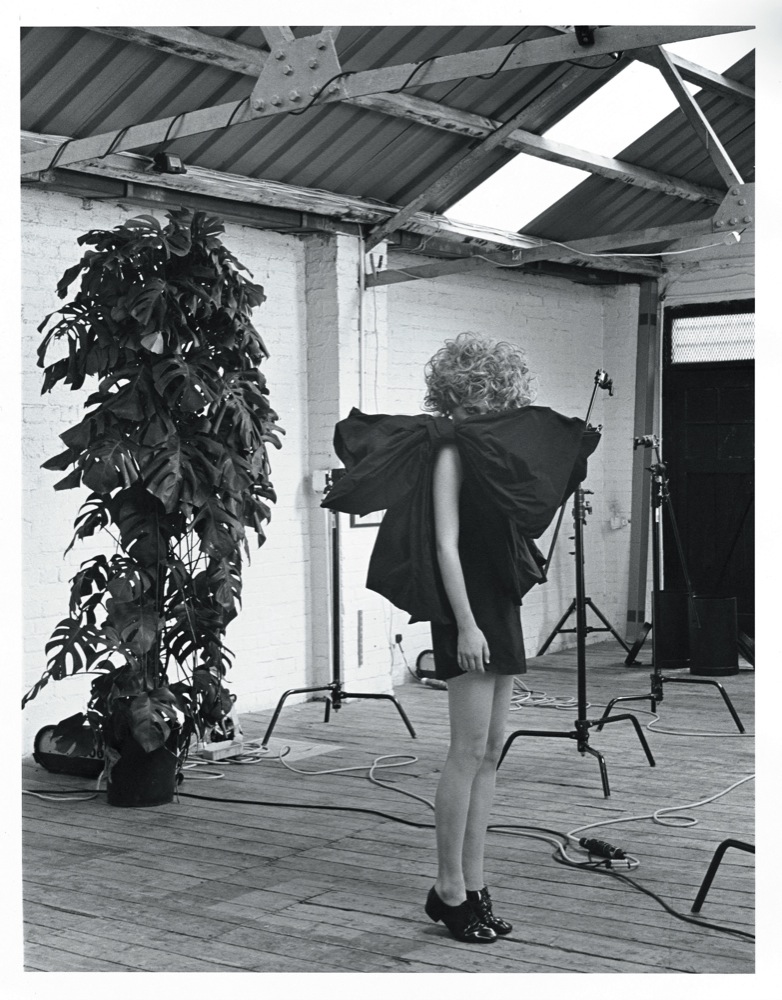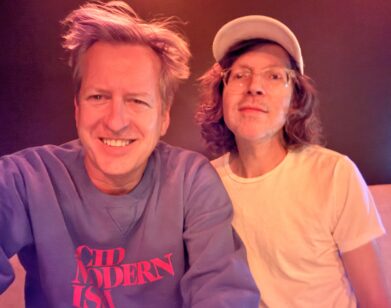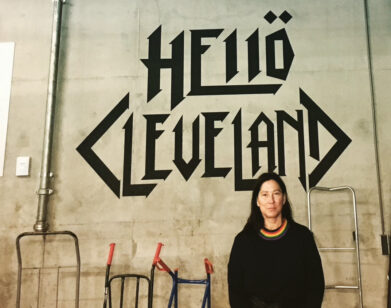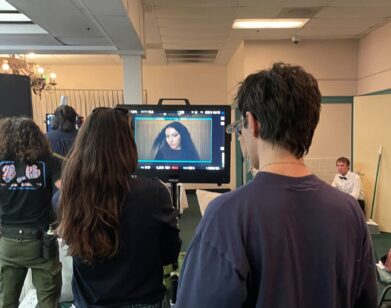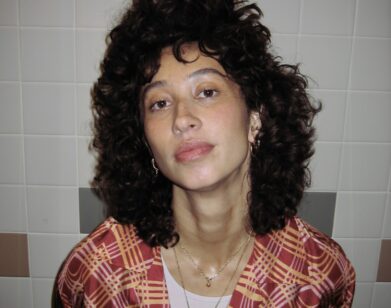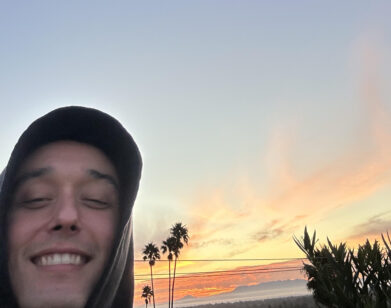Clemence Poesy
To most of the world, 25-year-old actress Clémence Poésy is known as either the comely French student in 2005’s Harry Potter and the Goblet of Fire, or, for less paranormal tastes, as one of the reigning faces of the Chloé fragrance campaign. But over the past few years, the gorgeous, almost dangerously innocent-looking Poésy has been primed for a much bigger part: that of future icon of French cinema. Poésy mentions both Catherine Deneuve and Jeanne Moreau in her interview with Olivier Zahm, which took place this past July on the Place Vendôme side of the Ritz in Paris. And in some ways, Poésy seems like some hybrid of the two French stars: at one turn, cool and complex like Deneuve; at another, wild and impulsive like Moreau. Poésy recently appeared opposite Gaspard Ulliel in the Godard-like sci-fi romance La Troisième partie du monde and just wrapped a British thriller called Heartless with actor Jim Sturgess. If she is getting ready to take over France, she may have her alternative upbringing to thank. You learn a lot about yourself when your parents tell you the television is permanently broken.
OLIVIER ZAHM: You chose your mother’s last name, Poésy, for purely aesthetic reasons. It is a beautiful name. Is that why you chose it?
CLÉMENCE POÉSY: Yes, and it makes life easy!
OZ: There’s something very light about your physical appearance-an elegance that could even be described as French. What do you think gives Clémence Poésy her charm?
CP: I have no idea. I don’t think I’m the one to ask.
In Los Angeles, you feel like everything revolves around the movies. in paris, you still have other things to do; we have a life outside of it. Clemence Poesy
OZ: What kinds of compliments do you receive?
CP: I’ve often been told that I’m a bit strange. I hear that pretty regularly, but it is not how I see myself. I feel like I’m extremely normal. I do have a bizarre face that’s a bit out of proportion. I guess that’s why some people see me as strange. [laughs]
OZ: Are you saying that in all beauty there’s something deformed?
CP: Exactly, yes, that’s totally what I mean! See, I have lots of mosquito bites everywhere.
OZ: So, you chose your mother’s last name, and yet your father is the one who’s an actor. He directs his own theater company, right?
CP: Yes, it’s mostly my father who made me want to go into this profession. Well, both my parents are pretty guilty. They always shared-and continue to share-their artistic crazes and their literary enthusiasm. They took us to the theater and to the movies a lot. They didn’t let us watch TV-
OZ: Deprive your children of television: That’s something families don’t do at all anymore.
CP: Right. In the ’80s, I was the only one who didn’t watch the shows about teenagers. I had to go over to friends’ houses to see them. I still don’t have a TV!
you have to encourage people not to give in to the temptation to be normal, even if it isn’t easy—because when you’re young, you really want to belong.Clemence Poesy
OZ: So you were raised on theater and literature instead. What kind of theater did your father like?
CP: When I was little, he performed in a troupe called the Théâtre du Campagnol, which rebelled against the Théâtre du Soleil against Ariane Mnouchkine at the Cartoucherie de Vincennes. They took over a pool outside of Paris in Châtenay Malabry and turned it into a theater, which was called the Piscine. Then my father ended up starting his own company called the Théâtre du Sable.
OZ: So you arrived right in the middle of this alternative-theater explosion.
CP: When I was born, my father was still young. He was 24. He was on tour a lot. But when he was there, he was really there. I feel that I knew him well anyway. And my mother was a French teacher.
OZ: I read that you spent your childhood in Meudon [a town southwest of Paris].
CP: I didn’t live in Meudon. I went to school there.
OZ: I was fantasizing about a bourgeois childhood.
CP: Oh, no, my childhood wasn’t bourgeois at all. I was in Châtenay-Malabry outside of Paris, and we lived in an old housing development for workers called La Butte Rouge, which architecture students still visit. But I didn’t go to school there. My parents decided to put me in an alternative school in Meudon. I had to take 40 buses to get there. [laughs]
OZ: Do you have good memories of being at such an experimental school?
CP: It was a great privilege. We had relationships with adults that weren’t based on authority or obligation. There was real freedom, and I think they were trying to teach us about independence. At the same time, I ended up doing my senior year at the École Alsacienne! That’s why I’m bizarre—
OZ: That’s the most elitist high school in Paris!
CP: It’s very elitist, but I got in thanks to a scholarship offered to teachers’ children. And I was a very good student at the time.
OZ: You were born in 1982, but really you’re a child of the previous decade’s counterculture.
CP: My references, my musical tastes, everything that I like, in fact, comes from the ’70s.
OZ: That explains your strange side!
CP: I think there are a lot of us like this.
OZ: Not many! The ’80s sociologically and politically eliminated every attempt at alternative education.
CP: My mother kept alive the best part for my sister and me. At the same time, she’s always been someone who’s very straight and solid, which wasn’t that -common in families with “’68er” parents.
OZ: Your mother made you believe that the TV was broken so you wouldn’t watch.
CP: Once I caught my dad in front of the TV watching a tennis match, and I realized they were tricking us. Poor guy, he had to sneak in a tennis final—probably the French Open.
OZ: As a result, you and your sister watched a lot of films from the family movie library?
CP: Yes. We’d watch the same movie 20 times. We went through phases. There was a musical phase, like Fred Astaire and Gene Kelly, which we tried to perform in the living room as best we could. We saw quite a bit of Chaplin, too.
OZ: So, to be successful in life, do you believe that you have to be a bit maladjusted and strange?
CP: I firmly believe that-even if you pay for it in middle school, which I did.
OZ: You weren’t the popular girl?
CP: Not at all! But I think that’s really good. It gives you the courage to invent something that’s yours and also to find friends that you can really relate to-not to just go with what’s in. You can -immediately recognize people who have gone down a similar path, who are a bit maladjusted as well. You have to encourage people not to give in to the temptation to be normal, even if it isn’t easy—because when you’re young, you really want to belong.
OZ: Had you already started to perform by the time you were in high school?
CP: I had starred in TV movies without much artistic value. They gave me a certain range. I knew that I was going to continue my studies, but I wanted to try something else on the side. I wanted to see what would come of it.
OZ: Do you remember your first audition?
CP: I was late. I had found an agent-and I still have the same one-who said to me, “I’ll try you out. But I’m warning you, you have to be on time to your appointments and if they tell you you’re bad, don’t take it wrong.” Because I was coming from the outskirts, I, of course, got lost in Paris and said to myself, “That’s it. It’s over.”
OZ: But it turned out to be “first try, first movie”?
CP: Oh, no. It doesn’t work like that in real life!
OZ: But you kept trying. Then you passed the exam for the Paris Conservatoire?
CP: I got in the second time, but in the end I didn’t do it. I would have really liked to, but they asked me to be in Harry Potter just at that same moment. The then-director of the conservatory, Claude Stratz, very kindly offered me a sabbatical year, but after that movie, my career took off. My small part in Harry Potter opened a door, and it was a shame to close it when it was just opening.
OZ: So what’s the story behind this partially naked scene of yours that’s on the Internet?
CP: That’s exactly what we’re not going to talk about! Those are scenes that you film when you’re 18 and the director considers them to be very important to the story. You trust him and then kick yourself for it.
OZ: Why? Because the movie is bad?
CP: That’s the problem with the Internet: You do a naked scene and then it’s taken out of context and put on websites that have nothing to do with film. I won’t do anything like that again!
OZ: So if there’s nudity in a script, even if it’s with a great director, you’re going to refuse?
CP: I’ll fight it.
OZ: What if it’s David Lynch?
CP: If I think about the nudity in Lynch’s films, it doesn’t bother me. That scene in my movie bothered me because it wasn’t indispensable, and I was too young to know it. I was 18. As a result, I’ve become hypervigilant. Ever since, when the same situation presents itself, I’ve made a point to talk to the director, so it’s not something I have to be subjected to.
OZ: Did you move to England at some point?
CP: No. I did a movie about Mary Stuart for the BBC that was filmed in Romania, and I spent eight months in England making Harry Potter.
OZ: You’re one of those rare French actresses who finds a place in British productions.
CP: It happened backwards-I was offered parts in France only after being in English films.
OZ: And now you’re a fashion icon. You’re alongside Chloë Sevigny and Anja Rubik in Chloé’s current perfume campaign.
CP: An advertising icon!
OZ: Isn’t that part of a young actress’s job now?
CP: It has become a system: Actresses sell. I took it by chance. I didn’t hunt it down. And it’s a good campaign. I didn’t feel I was selling my soul to the devil, and it was a way to get some freedom, too. I can wait for film projects without having to do things to live. I can also see myself in the image projected by Chloé perfume: the image of a woman who’s not aggressive, nor supersophisticated, nor supercomplicated.
OZ: How do you dress in everyday life?
CP: It has to be a game. I went grunge as a teenager—I put holes in all my clothes. I think it’s too bad when teenagers become conformist in terms of fashion,because it’s the ideal time to go off into your own crazy thing without looking completely idiotic.
OZ: What’s your biggest flaw?
CP: Stubbornness, inflexibility in certain discussions. There aren’t many people who can make me see that I’m wrong.
OZ: You always seem very natural.
CP: I believe a lot in the relationship between performers. When you’re supported by someone’s eyes, you’re not alone. An actor alone is a bit naked. Like when you do something in front of your mirror, you’re usually really bad, because you’re looking at yourself. To me, performing means trying to do the most you can with the partner in front of you, with the story you’re telling. There are actors who have carried me, who have brought me elsewhere or with them.
OZ: What’s the difference between a French -actress and an American actress?
CP: There’s a kind of amateurishness among French actresses, but I don’t share that completely. Is the great French actress Catherine Deneuve or Jeanne Moreau? A kind of coldness and control, or a lightness and spontaneity? American actresses are in a completely different system—it’s another planet, much more professional. We can’t imagine what that’s like! In Los Angeles, you feel like everything revolves around the movies. In Paris, you still have other things to do; we have a life outside of it.

